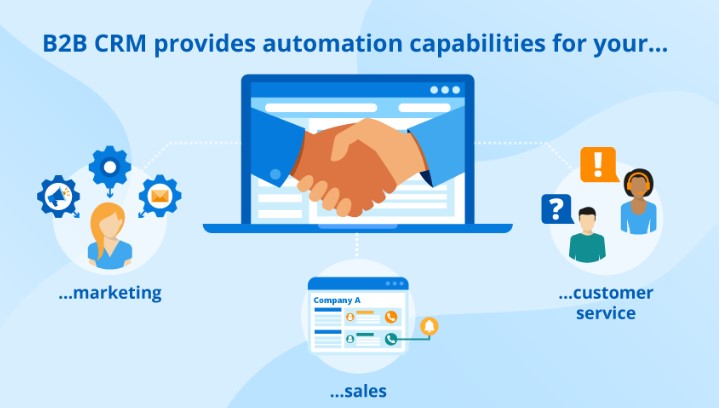In the business-to-business (B2B) world, customer relationship management (CRM) is essential for success. Building strong relationships with business customers requires a strategic approach that focuses on personalization, communication, and value. In this article, we will explore how CRM can be used to build strong relationships with business customers and discuss some best practices for implementing a successful B2B CRM strategy.
1. Know Your Customer
To build strong relationships with business customers, it’s essential to understand their needs, preferences, and pain points. This requires collecting and analyzing data about their interactions with your business, including their purchase history, feedback, and communication history. By using a CRM tool to track and analyze this data, businesses can personalize their approach and provide value to their customers.
2. Communicate Effectively
Effective communication is key to building strong relationships with business customers. This requires regular communication through multiple channels, including email, phone, and social media. It’s important to keep the communication relevant, personalized, and timely. By using a CRM tool, businesses can automate communication workflows and ensure that their messaging is consistent and targeted.
3. Provide Value
To build strong relationships with business customers, it’s essential to provide value through your products, services, and interactions. This requires a customer-centric approach that focuses on understanding and addressing the customer’s pain points and challenges. By using a CRM tool to track customer interactions and preferences, businesses can provide personalized solutions that meet their specific needs.
4. Measure Success
To ensure that your B2B CRM strategy is effective, it’s important to regularly measure and analyze success metrics like customer retention, customer satisfaction, and sales growth. By using a CRM tool to track and analyze these metrics, businesses can identify areas for improvement and adjust their strategy accordingly.
5. Automate Processes
To streamline your B2B CRM strategy, it’s important to automate processes like lead generation, customer segmentation, and communication workflows. By using a CRM tool to automate these processes, businesses can save time, improve efficiency, and provide a consistent customer experience.
Here are some best practices for implementing a successful B2B CRM strategy:
- Start with a clear understanding of your customer’s needs, preferences, and pain points.
- Use a CRM tool to track and analyze customer interactions and preferences.
- Communicate regularly through multiple channels, including email, phone, and social media.
- Provide personalized solutions that meet the customer’s specific needs and challenges.
- Measure and analyze success metrics to identify areas for improvement.
- Automate processes like lead generation, customer segmentation, and communication workflows.
In conclusion, building strong relationships with business customers requires a strategic approach that focuses on personalization, communication, and value. By using a CRM tool to track and analyze customer interactions and preferences, businesses can provide personalized solutions that meet their specific needs and challenges. By implementing best practices like regular communication, providing value, and automating processes, businesses can create a competitive advantage and drive growth in the B2B market.
Here are some FAQs related to B2B CRM:
-
What is B2B CRM?
B2B CRM refers to the use of customer relationship management tools and strategies in the business-to-business market. It focuses on building strong relationships with business customers to drive growth and increase sales.
-
How does B2B CRM differ from B2C CRM?
B2B CRM differs from B2C CRM in that it focuses on building relationships with businesses rather than individual consumers. B2B CRM typically involves longer sales cycles, higher transaction values, and more complex customer interactions.
-
What are the benefits of using a B2B CRM strategy?
Using a B2B CRM strategy can help businesses improve customer relationships, streamline processes, and increase sales. It provides valuable insights into customer behavior and preferences, enabling businesses to create personalized marketing campaigns and products.
-
How do I choose the right B2B CRM tool for my business?
When choosing a B2B CRM tool, consider your specific requirements and industry, as well as factors like pricing, features, integrations, and customization options. It’s also helpful to read reviews and compare different options before making a decision.
-
Can a B2B CRM strategy help improve customer retention?
Yes, a B2B CRM strategy can help improve customer retention by providing businesses with the tools to manage customer interactions efficiently, personalize the customer experience, and provide better customer service. By building strong relationships with business customers, businesses can create long-term partnerships and drive growth.
